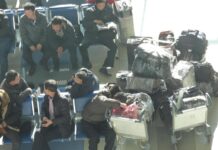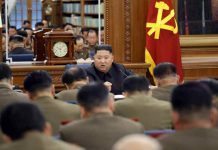
On Mar. 1, United Nations (U.N.) Secretary-General Antonio Guterres appointed Italian Joe Colombano as the U.N. Resident Coordinator (RC) in the Democratic People’s Republic of Korea (DPRK). Colombano took up his post on Mar. 1 with the approval of the North Korean government. He is the first representative of the international organization to enter the country since the coronavirus pandemic about three years ago.
Colombano has more than 25 years of experience in international relations and negotiations on political and development issues in the multilateral system. Within the U.N., he most recently served as Head of the Office of the United Nations Resident Coordinator in China (ROC) in Beijing, where he promoted key policies and international agreements, including the Sustainable Development Goals. Prior to that, he served for nearly a decade in the Executive Office of the Secretary-General in New York, including as Director for Sustainable Development and Senior Advisor to the WHO Special Envoy for COVID-19 in Geneva.
U.N. spokesperson Stephane Dujarric said in a Mar. 1 press briefing that in his new role, Colombano will “support the country’s commitment to the 2030 Agenda for Sustainable Development and lead the U.N. team’s efforts” – including in the areas of food and nutrition security, social development services, resilience and sustainability, and data and development management.
The goal of the ROC is to facilitate the delivery of UN aid and assistance to North Korea.
Colombano will bring important skills to the ROC in North Korea, which serves as a central hub for the coordination and implementation of U.N. values and activities. It coordinates UN humanitarian and development concerns with national priorities and monitors the impact of U.N. activities. It aims to facilitate the delivery of U.N. assistance and support to North Korea, with a focus on sustainable development, meeting humanitarian needs, and improving the well-being of the population. Today, 130 Resident Coordinators head 132 Resident Coordinator offices worldwide, serving 162 countries and territories.
Until the COVID-19 pandemic, the RC issued reports and strategic plans to assess the situation in North Korea. The most recent was released on Apr. 22, 2020, and speaks of a “protracted cycle of humanitarian need” in North Korea, with 10.4 million people in need of outside assistance. The 2020 Needs and Priorities Plan aimed to provide humanitarian assistance to some 5.5 million of the most vulnerable people in North Korea – such as children or pregnant women – for whom USD 107 million in aid was requested.
In addition to food insecurity and malnutrition among the population, data from the 2020 assessment revealed long-term and acute humanitarian needs in other areas, including access to health services, clean water, and sanitation. At the time, the ROC estimated that approximately 8.4 million North Koreans did not have access to safe drinking water.
According to the report, about 2.5 million people in North Korea were reached with humanitarian assistance in response to humanitarian needs in 2019. In particular, 94% of targeted children under the age of five received the assistance they needed. As one of the last measures before the closure, the Humanitarian Country Team had developed a Strategic Preparedness and Response Plan (SPRP) for the COVID-19 pandemic in cooperation with the Government of the DPRK.
Appointment comes amid rising tensions between the two Koreas
The fact that North Korea is once again tolerating an RC in its country could perhaps be seen as a concession to the international community.
The appointment of Joe Colombano as U.N. Resident Coordinator in North Korea may come at a crucial time. In the midst of one of the biggest diplomatic crises since the Korean War, diplomatic and international cooperation on the Korean Peninsula is more important than ever.
Military exercises and missile tests on both sides have increased and intensified significantly since North Korean dictator Kim Jong-Un announced earlier this year that his country was abandoning its long-standing goal of peaceful reunification with the South and would not avoid war.
The fact that North Korea is once again tolerating an RC on its soil could even be seen as a small concession – a sign that it may want to engage more in common goals and dialogue with the international community. It will now be up to Colombano and his team to advance the United Nations’ goals of peace, sustainable development, and humanitarian aid in one of the world’s most isolated countries.
Edited by Robert Lauler.


















